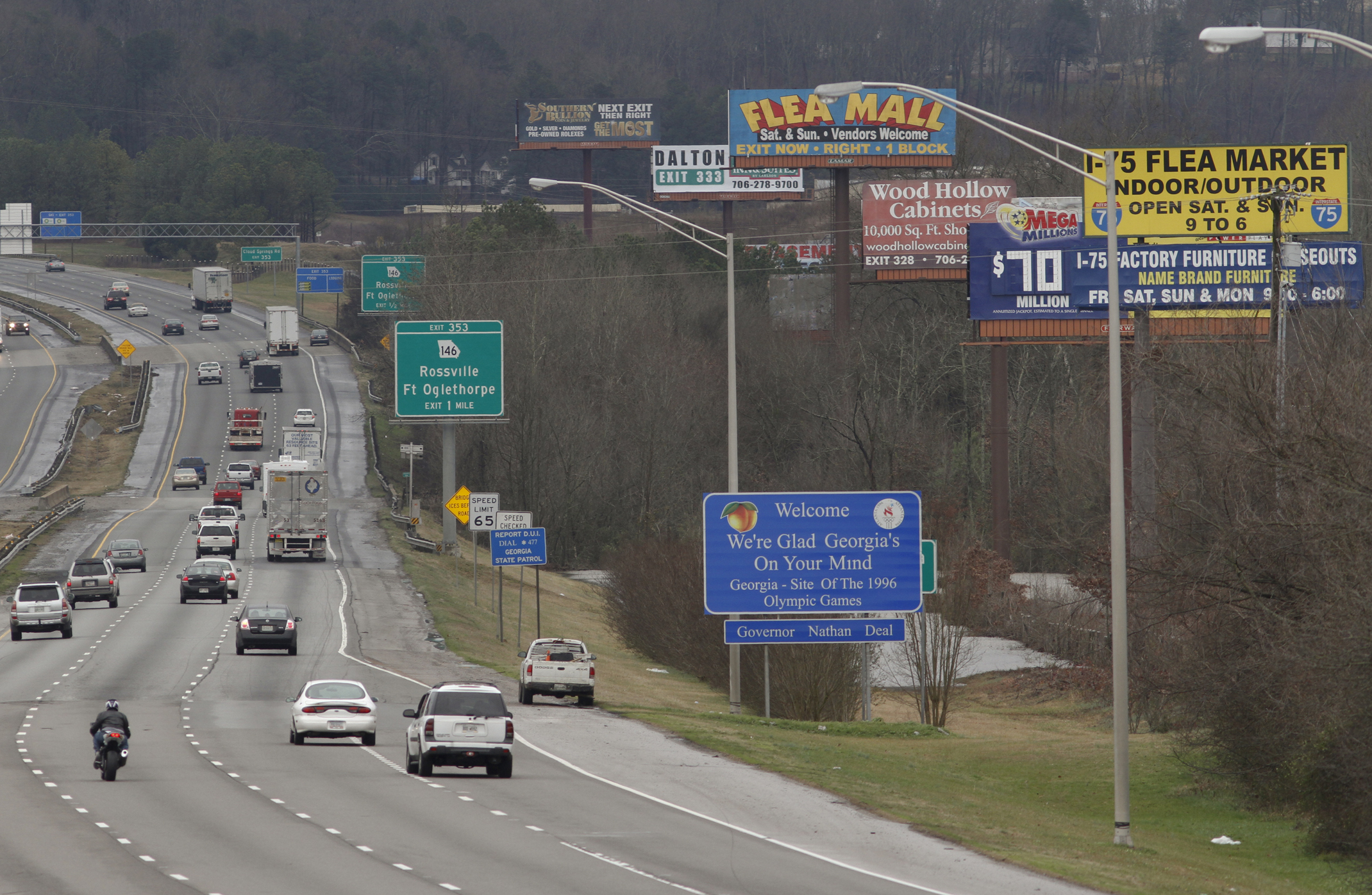Billboard companies in Georgia can go on the public highway rights-of-way and clear-cut trees that block their signs, under a law OK'd last year by the state Legislature.
That doesn't sit well with the city of Columbus, Ga., and two nonprofit organizations there, the Gateway Foundation and Trees Columbus, that have spent millions of dollars planting trees and otherwise landscaping near highways and cloverleafs.
They took their case on Jan. 8 to the Georgia Supreme Court, which is expected to rule by July on the new law's constitutionality.
The billboard opponents argue the clear-cutting is a gift of the public's resources -- its trees and scenic easements -- to billboard companies that will pay what opponents say is a pittance for trees they cut. Meanwhile, outdoor advertisers say signs provide information to motorists and entice them to stop and spend millions of dollars, which benefits the state's economy.
The legal battle is just the latest skirmish in a long war between billboard companies and highway beautification advocates who would like to see billboards -- "sky trash," some call them, and "litter on a stick" -- go away.
It's a nationwide conflict. At the anti-billboard end of the spectrum are four states -- Alaska, Hawaii, Maine and Vermont -- that ban billboards. Some 700 communities around the United States also prohibit construction of new billboards, according to the group Scenic America.
Chattanooga city ordinance states that some streets should be billboard-free and forbids billboards on scenic corridors. Mayor Ron Littlefield a year ago criticized a billboard company after it put up three new signs along Volkswagen Drive before the city was able to annex the land and ban billboards under the scenic designation.
Elsewhere in Tennessee, Knoxville has forbidden new billboards since 2001, and Knox County Commissioner Richard Briggs in the fall introduced resolutions to stop construction of new billboards in Knox County, including digital billboards, and to prevent the conversion of existing billboards to digital.
At the other end of the spectrum are such agencies as the Tennessee Department of Transportation, which has allowed billboard companies to clear-cut on the public right-of-way since 1983.
Florida passed a law in 2006 that goes even further. It allows billboard companies to sue for lost profits, according to the South Florida Sun-Sentinel, if the state fails to allow removal of trees on the public-right-of-way that block advertisers' messages.
A total of 30 states have some type of vegetation management program for billboards, according to the Outdoor Advertising Association of America.
Law will 'completely alter' landscape
Billboard companies spent more than a decade -- and about $200,000 on lobbying during the 2010 election cycle, according to an Atlanta Journal Constitution analysis -- to sway Georgia legislators to pass House Bill 176 in 2011 to allow clear-cutting on public land in front of signs.
Previously, billboard owners were allowed to cut hardwoods less than 8 inches in diameter and pines under 12 inches in diameter on public land.
The new law "not only threatens to completely alter the landscape on every highway in Georgia, but also dedicates the public's property to private business for little or no value," reads a friend-of-the-court brief filed by Scenic Georgia, the Garden Club of Georgia and Trees Atlanta.
Without legislation permitting it, billboard companies would have no right to cut trees on public land, the brief states.
The new law doesn't factor in the benefit billboard companies get from having a permanent "visual easement" to their signs, the groups argue, and gives billboard companies a state-paid subsidy.
"The GDOT is left with the public expense of maintaining the now-cleared swath of public right-of-way," their legal briefs state.
Another freebie for billboard companies, opponents argue, is a section of the law that gives them financial credit toward tree removal for taking down old billboards.
David Flint, attorney for the Outdoor Advertising Association of Georgia, said the information conveyed on billboards is a public benefit.
"When I was a kid growing up in Georgia, we really appreciated signs, because that was the only way we could get the Yankees to stop," Flint said, mentioning the iconic "See Rock City" roadside signs as an example.
"A newspaper gives people information," he said. "These signs give people information."
Spending in Georgia is increased by more than $45 million annually because of motorists learning about retail opportunities advertised on billboards, Flint's legal brief stated, citing Georgia State University economics professor Bruce Seaman.
"It creates jobs," Flint said. "It gets people to stop and buy things."
Tennessee trees can be clear-cut
In Tennessee, billboard companies can clear-cut trees on state rights-of-way on Interstates and on larger state highways -- but only for billboards erected before 1983.
The state issues an average of 34 new tree-clearing permits annually to billboard companies and 218 maintenance permits, Tennessee Department of Transportation Beautification Coordinator Shawn Bible said.
A new permit costs $250 and a maintenance permit is $50, she said.
"It does not cover all costs, but it does cover a good portion of the costs," Bible said.
When the law allowing clear-cutting went into effect in 1983, the billboard companies made concessions -- for example, agreeing to greater spacing between signs.
"We have fewer billboards," Bible said, because of the compromise.
While companies can clear-cut a 500-foot swath in front of their signs, they have to choose carefully, she said, because once they've picked the spot to clear-cut they can't change it.
"It's a big decision, that first cut," she said.
TDOT doesn't let billboard companies cut willy-nilly, according to Bible.
"If you build your sign behind existing trees, we will not let you go in later and cut them down," she said.

